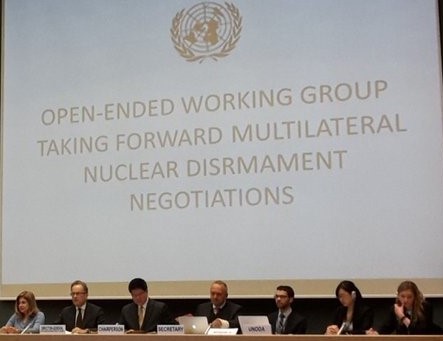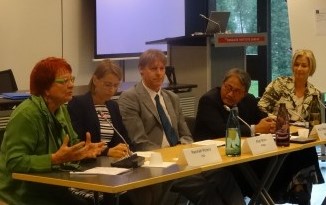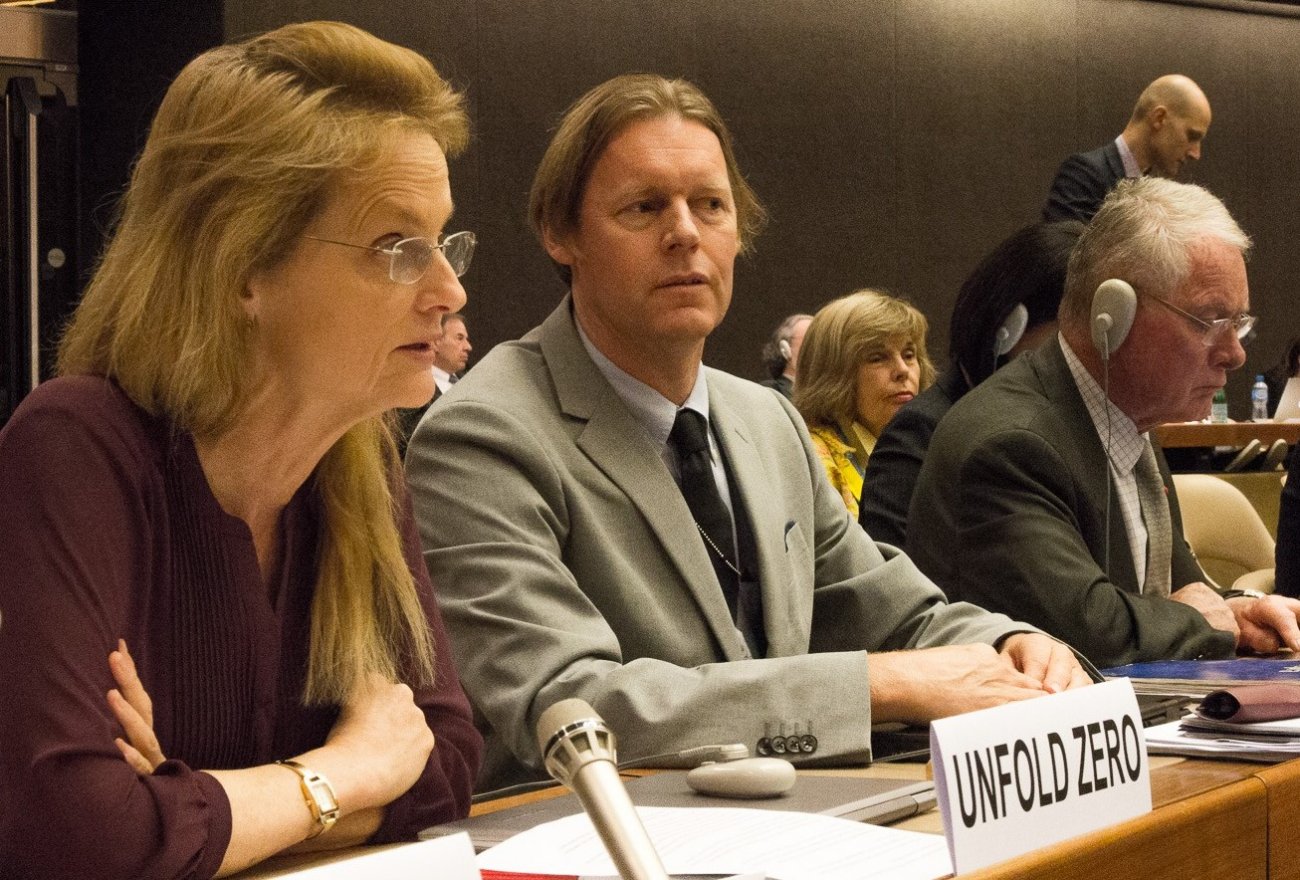PNND participates in UN Working Group on nuclear disarmament. Non-nuclear countries propose that negotiations start in 2017 on a treaty to prohibit nuclear weapons. Nuclear umbrella countries push for negotiations on 'building blocks' before they will agree to prohibition. A Framework Agreement might be the best approach.
Deliberations of the United Nations Open Ended Working Group on Taking Forward Multilateral Nuclear Disarmament Negotiations (OEWG) in Geneva from May 2-13 indicate that a group of non-nuclear countries appears ready to start negotiations in 2017 on a treaty to prohibit nuclear weapons, regardless of whether or not nuclear umbrella countries or nuclear-armed countries join.
Nine countries from nuclear-weapon-free zones (Argentina, Brazil, Costa Rica, Ecuador, Guatemala, Indonesia, Malaysia, Mexico and Zambia) submitted a proposal to the OEWG to ‘Convene a Conference in 2017, open to all States, international organizations and civil society, to negotiate a legally-binding instrument to prohibit nuclear weapons’ and ‘to report to the United Nations high-level international conference on nuclear disarmament to be convened no later than 2018…on the progress made on the negotiation of such an instrument.’

The proposal received support from a number of other non-nuclear States and civil society organizations during the OEWG sessions. However, none of the nuclear umbrella countries (NATO, Japan, South Korea and Australia) agreed with the proposal. The nuclear-armed States, who did not participate in the OEWG, are also opposed.
Many of the non-nuclear States argued that agreement from the nuclear-reliant states was not necessary to negotiate such a treaty. However, others argued that if such a treaty did not include at least some of the nuclear-reliant states, it would have little or no impact on nuclear weapons policies and practices. Indeed, some argued that it could be counter-productive, taking pressure off the nuclear-reliant states to adopt interim steps toward nuclear abolition.
The 'building blocks' approach
An alternative option, proposed primarily by nuclear-reliant states, was a 'building blocks' or 'progressive' approach. This calls for negotiations on a number of disarmament measures - such as stockpile reductions and a fissile material treaty - prior to negotiating any prohibition on use of nuclear weapons or their posession.
Many non-nuclear States criticized the ‘building blocks’ approach as not promoting sufficiently strong measures in the near-term. Indeed, they argued that the 'building blocks' approach has gone no-where in 20 years, and its time to start negotiating a clear and comprehensive prohibition treaty, even if it did not include the nuclear-reliant countries.
A Framework Agreement
A third approach proposed was a framework agreement, i.e. a treaty that sets out broad commitments which are then implemented and expanded upon in further instruments negotiated according to an agreed process. A good example is the UN Framework Convention on Climate Change.
Sweden noted that a framework approach could bridge the divide between the two main groups of countries - those that call for prohibition first followed by steps to eliminate the weapons, and those who call for disarmament steps first followed by prohibition. Under a framework agreement various measures on prohibition and disarmament could be negotiated with individual countries ratifying each measure according to the sequence that best suits them. (See Sweden intervention on pathways to a nuclear weapon free world).

The proposal for a nuclear disarmament framework agreement was suggested by the New Agenda Coalition in an NPT working paper in 2014, and has been further discussed in Framework Forum events organised by PNND and the Middle Powers Initiative in September 2015 and April 2016.
Three working papers on the framework agreement proposal were submitted to the May session of the OEWG: NGO 7 Building the Framework for a nuclear-weapon-free world submitted by the Basel Peace Office, NGO 12 A legal instrument for the prohibition and elimination of nuclear weapons submitted by the International Association of Lawyers Against Nuclear Arms, and NGO 20 Options for a Framework Agreement, Middle Powers Initiative.
Tarja Cronberg, Chair of the Middle Powers Initiative, noted at the OEWG that a Framework Agreement could provide the best compromise to move forward. 'A framework agreement that emphasizes political rather than legal commitments at the outset might be the most conducive to building engagement with nuclear-armed States on interim measures, while simultaneously providing possibilities for early adoption of stronger measures by non-nuclear States.'
Eliminating the role of nuclear weapons
One of the main reasons that the nuclear-armed countries did not participate in the OEWG, and why the ‘nuclear umbrella’ countries do not support a nuclear prohibition treaty is because these countries still rely on nuclear weapons for their security.

Alyn Ware, PNND Global Coordinator, reminded delegations that the parliaments of virtually all the countries represented at the OEWG, as well as those of eight of the nine nuclear-armed States, agreed at the Inter Parliamentary Union Assembly in 2014 to ‘work with their governments on eliminating the role of nuclear weapons in security doctrines‘ and to ‘urge their governments to start negotiations on a nuclear weapons convention or package of agreements to achieve a nuclear-weapon-free world.’
The OEWG included useful discussion on the role of nuclear weapons in the 21st century and whether it’s possible to eliminate the role of nuclear weapons, including during current times of increased conflicts between nuclear-reliant countries.
A number of non-nuclear States and civil society organisations emphasized the possibilities for achieving security, reducing tensions and resolving international conflicts through alternative means. Heather Wokusch from UNFOLD ZERO, noted that these included diplomacy, law, mediation, arbitration, adjudication and the use of common security mechanisms in the United Nations, Organisation for Security and Cooperation in Europe and other bodies. See UNFOLD ZERO intervention to the OEWG.
Tarja Cronberg, Chair of the Middle Powers Initiative and former Chair of the European Parliament Contact Group with Iran, highlighted the recent agreement with Iran as an example of using diplomacy to prevent nuclear proliferation, and reduce nuclear-related conflicts.
Building political will – nuclear disarmament summits
A number of countries and NGOs focused on a different issue – the lack of political will and commitment of the nuclear-reliant States to nuclear disarmament. The Middle Powers Initiative, Arms Control Association, Basel Peace Office, Parliamentarians for Nuclear Non-proliferation and Disarmament and UNFOLD ZERO proposed a series of Nuclear Disarmament Summits in order to build such political will.
Modeled on the success of the Nuclear Security Summits – which built cooperation and commitment to prevent nuclear terrorism – a series of bilateral (US-Russia) and multilateral nuclear disarmament summits would enhance media and public attention to the issue and increase the pressure on nuclear-reliant states to adopt key disarmament measures. See Nuclear disarmament summits: Building political traction for the adoption and implementation of legal measures and norms, MPI working paper to the OEWG.
Where-to from now?
The OEWG will hold its final session for 2016 over three days in August (16, 17 and 19). It will then adopt a report to present to the United Nations General Assembly. It is unlikely that consensus will be achieved on either a ban treaty (the most popular proposal amongst the non-nuclear States) or the building blocks (‘progressive) approach which is the most popular proposal amongst the nuclear-reliant states.
The proposal for a framework agreement might emerge as a compromise approach. If not, it’s looking more and more likely that a group of non-nuclear States will move ahead in 2017 to commence negotiations on a prohibition treaty regardless of the likely non-participation of nuclear-reliant states.
Some relevant OEWG working papers
Below are some of the working papers submitted by NGOs to the OEWG. A full list of working papers can be found at www.unog.ch/oewg-ndn.
- NGO 5 Quest of Legal Measures with Specificity and Feasibility for Nuclear Disarmament, Peace Depot
- NGO 7 Building the Framework for a nuclear-weapon-free world; Basel Peace Office
- NGO 9 Open letter to the OEWG, Mayors for Peace
- NGO 11 Respond to the critical moment, Global Security Institute
- NGO 12 A legal instrument for the prohibition and elimination of nuclear weapons, International Association of Lawyers Against Nuclear Arms
- NGO 13 Nuclear Risks, Human Survival Project and People for Nuclear Disarmament
- NGO 21 Nuclear disarmament summits, Middle Powers Initiative
- NGO 20 Options for a Framework Agreement, Middle Powers Initiative
- NGO 23 Options for moving forward on disarmament; Arms Control Association
- The contribution of domestic policies to advancing multilateral nuclear disarmament, World Future Council


